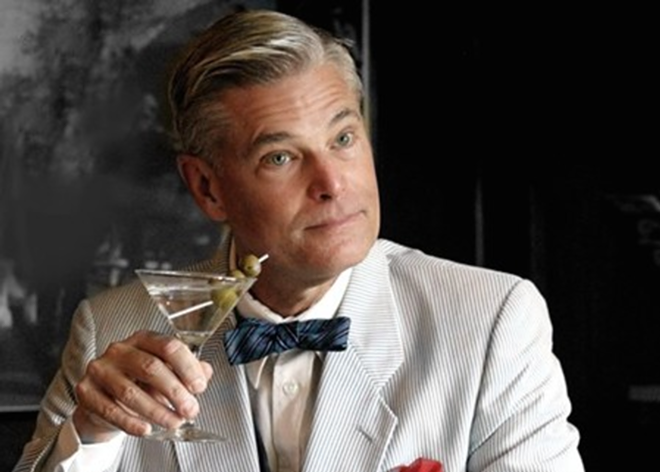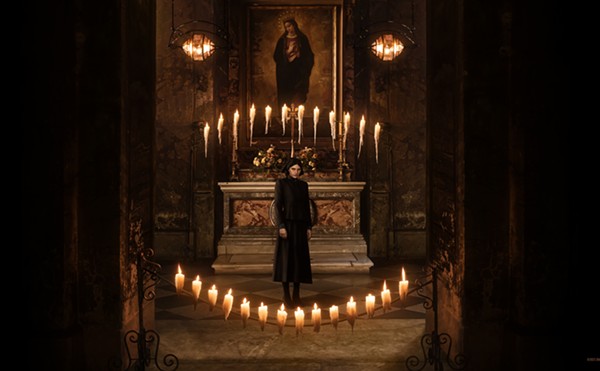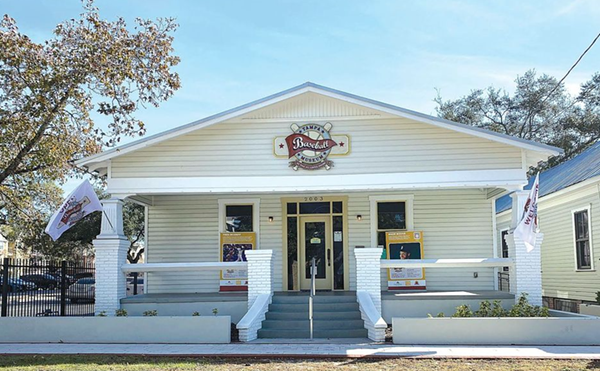Harvey runs through May 3. 7 p.m., Thurs., 8 p.m. Fri. and Sat., 2 p.m. Sat. and Sun. at freeFall Theatre, 6099 Central Ave., St. Petersburg; 727-498-5205. $21-$46 general admission; $21-$43 students, seniors, teachers, military. freefalltheatre.com.
The first act of Harvey is so lacking in substance, it leaves you unprepared for the strengths of Act Two. More specifically, Mary Chase’s 1945 play (a Pulitzer Prize winner) starts off as little more than a sitcom about a man who has an imaginary friend. That this friend is a six-foot-three white rabbit hardly matters: the act’s success hinges on a case of mistaken identity (who gets committed to a sanitarium, delusional Elwood P. Dowd or his sane sister Veta?) and offers nothing else to think about and little reason to care.
But then intermission ends and we’re gifted with comedy that begins to matter. It’s suggested in the new act that Elwood consciously chose his hallucination out of an experienced distaste for the world of reason, and it’s further suggested that the needs of those around him — including a venerable psychiatrist — might be so similar to Elwood’s that rabbits are appearing for them too. Now the play begins to earn its Pulitzer — after all, the relative desirability of reality and unreality is a theme decidedly worth our time. But even this improvement doesn’t quite salvage Harvey: we’ve spent so many minutes on the bland appetizer, the succulent entree just feels tardy. The acting in freeFall Theatre's fine production is likable; the direction is skillful; the set and costumes are top-notch — and still the play seems lightweight and too unbalanced. Certainly there are better comedies in need of revival.
At the start, Elwood P. Dowd is mostly his sister’s problem. We meet Veta Louise Simmons at a party, where she and her daughter Myrtle are distraught at their dependence upon their embarrassing brother and uncle. Bonnie Agan plays Veta as a woman with a full plate, who’d certainly be happier if only Elwood were out of the way. And Cassandra Bissell as Myrtle is sure that she’ll never meet any eligible men if wacko Elwood is always around to scare beaus away.
There’s only one obvious solution: turn the delusional but friendly kinsman over to a sanitarium run by William R. Chumley, M.D. — the sturdy John Lombardi — and his young charge, Dr. Lyman Sanderson, embodied by the brightly precise Chris Jackson. But when Veta takes Elwood to the asylum, Dr. Sanderson assumes that she, not he, is the insane one, and has her incarcerated and subjected to humiliating medical procedures. (I wish that some comment were being made here about the craziness of sane people, but there seems to be no such intention.)
[SPOILER ALERT: A freeFall cast member has pointed out that there's a plot point discussed in the following paragraph that could spoil the surprise for newbies to Harvey. So if you haven't read the play or seen the movie, read on at your own risk.]
When she finally gets free, Veta is dead set on suing the sanitarium, and she calls on her attorney Judge Gaffney — played with dependable comic skill by Glenn Gover — to make the next legal moves. But it’s around here (in act two) that we begin to hear from Elwood himself — portrayed superbly by the ingratiating Larry Alexander — and we find evidence that he may have decided years before that the world of sense is so vicious, he’d rather be a pleasant, perhaps alcoholic lunatic. As we’re considering this notion, the affliction extends to Dr. Chumley, who is certain that rabbit Harvey is camping out in his office. Will the contagion spread further? Will Elwood be injected with a “shock formula” that always turns psychopaths into blank zombies? Will Dr. Sanderson ever get naked with the splendid Kelly Pekar’s Nurse Kelly? What about orderly Wilson (the very funny Brian Shea)? Will he turn out to be the man Myrtle Simmons has been waiting for? And why are all these subplots competing for our time when the only question of importance is what to make of Elwood’s delusions?
There are a couple of other brief performances — Richard Coppinger’s as a cabbie is the most memorable — along with a few hints that author Chase is a critic of the mental health establishment. But James Rayfield’s tiptop staging on Charles Murdock Lucas’s attractive set can’t distract us from the judgment that Harvey offers too little too late. There are better plays out there about the willingly mad — try Hamlet, or Pirandello’s Henry IV — and the idea that one has to choose lunacy if one wants to be decent is obviously false. Harvey may have won a top drama prize, but no one claims now that it deserved it. Even the first-rate freeFall treatment can’t make this third-rate play valuable.



















